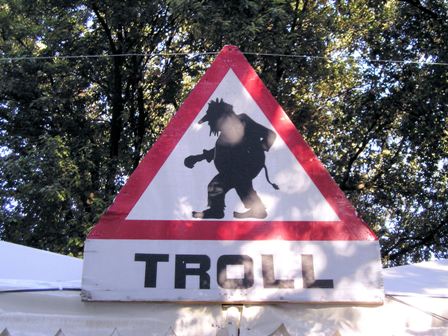block early, block often: being a feminist on social media

It’s tricky being a feminist on the internet, nay, it’s tricky being a woman on the internet at all. Rape threats, death threats, rape and death threats, and every insult you could imagine are an everyday experience for many women who dare to exist online.
If you are new to feminism and have just started becoming vocal on social media about issues that concern you, there is the inevitable realisation that many people you know are viciously anti-feminist or just out-right arseholes, and will at some point decide to rub this all over your feed.
Welcome to the world: most people are horrible and still think feminists are frigid, man-hating, humourless lesbians. And these people love to tell you how feminism is wrong, or more specifically, how you are doing it wrong.
But you know what’s nifty about most social media platforms? The block function. (All glory and honour is yours, for ever and ever, Amen.)
I cannot count the number of times a discussion on my Facebook or Twitter has been derailed by some idiot “friend” or follower who suddenly decides it’s truth-time and they’re gonna tell me exactly all the ways that feminism is the work of the devil and that all women are lying bitches.
BLOCK THESE PEOPLE.
These people are not interested in respectful, critical, constructive discussion. Their opinion is no longer valid. They are latent jerks who were just waiting for the right time to unleash their bitterness.
As a proud feminist killjoy, I get this hate all the time. Some guys (it’s usually guys) who I’ve known through friends or as part of a broader scene, suddenly start commenting on threads and become really antagonistic and aggressive. Many have accused me of misandry for pointing out sexism – this is one of the simplest ways to identify a sexist ignoramus – while going on to spout misogynist sentiments. Many come to a discussion about victim-blaming and go on to relentlessly slut-shame and victim-blame (one guy did this to woman who had just reported being assaulted).
Maybe they’re trolling, maybe they’re pretentious devil’s advocate types who just want to practice their debating skills and think that derailing a feminist discussion is a cool way to go about it. And maybe they just don’t respect women voicing their opinions and engage in bullying to put the woman “back in her place”.
Sometimes you can talk these people around. Sometimes they were just frustrated and didn’t know how to properly articulate their views. Sometimes they are not well-versed in social etiquette and accidentally step on toes. It can be a great learning experience when this happens, when you both learn and grow and reach a common understanding. But oftentimes this is not the case, and you’re dealing with a genuine jerk.
It gets to the point where you must decide: is this person worth existing in my online world? Are they offering me anything of value (friendship/interesting discussion/useful links, etc)?
Social media is what you make of it – Twitter perhaps more so than Facebook, as there is no pesky “friend” label and followers are generally acquired through like-mindedness and your ability to inform and entertain, rather than simply via association. You surround yourself with the people of your choice.
Don’t feel obligated to remain “friends” with someone if you don’t want to. I think this sense of obligation is the most common reason for why we put up with jerks online. It can be a fraught business, definitely. It can be difficult to block someone online if you know that you will have to encounter them in real life, too. There is the worry that blocking will further antagonise them.
In my experience, however, blocking someone sends a very simple and clear message: that a person’s attitude or views are not cool with you, and that you no longer wish to engage with that person. Overwhelmingly this is accepted. (If not, you might have a bigger problem on your hands and there are official policy guidelines you can refer to in the case of stalking, threats and abuse.)
It is important to remember that your socmed account is your space, and you can block or unfriend at your leisure. If it has become an unsafe or unpleasant place for you, make a new, more secure or private account and only friend/follow those you actually want to be friends with.
Of course there are other approaches. Writer Catherine Deveny is a fan of retweeting the abuse she receives on Twitter, while performance artist Van Badham is a self-described Troll Hunter who actively takes on trolls with her awesome, biting rhetoric.
But I am a blocker. I am a “no more drama” kinda woman. If it’s obvious that respect has gone out the window, and that constructive debate has descended into bullying or trolling – block ’em. Block early, block often, and surround yourself with wonderful, insightful, and above all, respectful people. Keep your online spaces as places in which you actually want to be.
By Jessica Alice
Jessica Alice edits poetry for Voiceworks magazine, produces Spoken Word and Women on the Line for 3CR 855AM, and co-presents the feminist podcast Wham Bam Thank You Ma’am. She blogs at hersute.tumblr.com and tweets @jessica_alice_.

